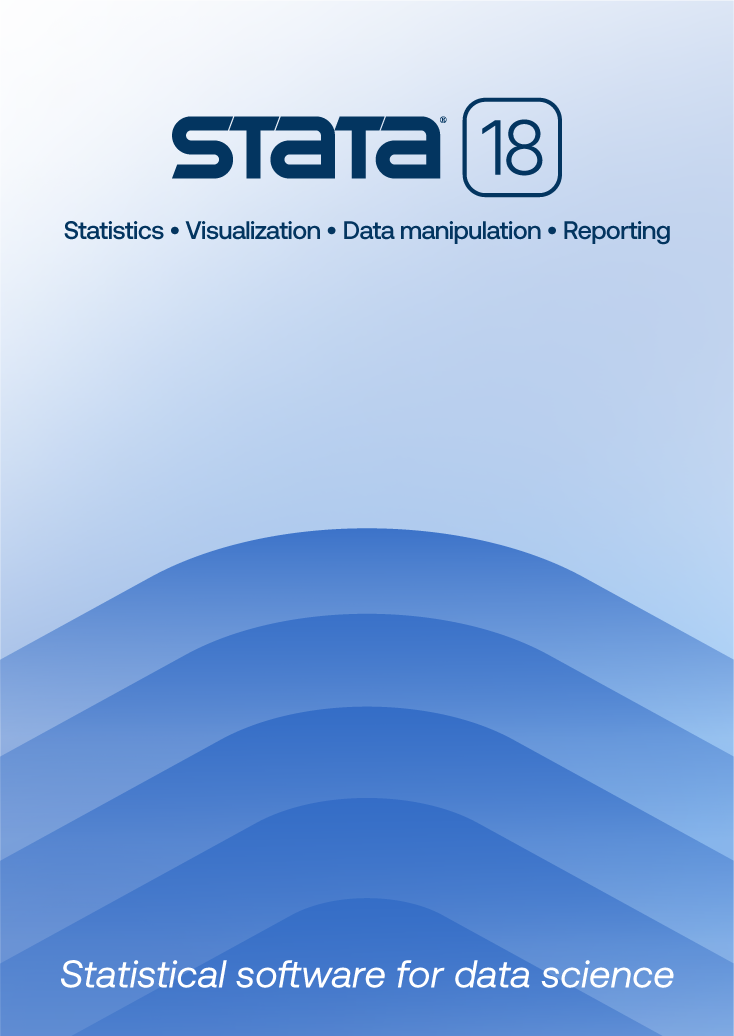ORDER STATA
Bayesian analysis
Fit Bayesian regression models using one of the Markov chain Monte Carlo
(MCMC) methods. You can choose from a variety of supported models or even
program your own. Extensive tools are available to check convergence,
including multiple chains. Compute posterior mean estimates and credible
intervals for model parameters and functions of model parameters. You can
perform both interval- and model-based hypothesis testing. Compare models
using Bayes factors. Compute model fit using posterior predictive p-values.
Generate predictions. And much more.
Learn about Bayesian analysis and see examples of Bayesian features, including Bayesian econometrics and Bayesian model averaging (BMA).
See what's new in Bayesian analysis.
Also see an Overview example.

Estimation


- Thousands of built-in models, by combining
- over 60 likelihood models, including univariate and multivariate normal, logit, probit, ordered logit, ordered probit, Poisson ...
- Many prior distributions, including normal, lognormal, multivariate normal, gamma, beta, Wishart ...
- Continuous, binary, ordinal, count, and survival outcomes
- Univariate, multivariate, and multiple-equation models
- Linear and nonlinear models
- Continuous univariate, multivariate, and discrete priors
- bayes: prefix

- Simply type bayes: in front of any of 58
estimation commands to fit Bayesian regression models
- Change any of the default priors
- Change any of the simulation or sampling
settings
- Time-series operators
- Control Panel lets you specify and fit models from an
easy-to-use interface
- Multiple chains
- Use GUI to fit models
- Use command language to fit models


- Time-series operators
Classes of models


Likelihood models

Prior distributions

- Normal

- Generalized (location-scale) t
- Lognormal
- Uniform
- Gamma
- Inverse gamma

- Exponential
- Laplace
- Cauchy
- Beta
- Chi-squared
- Pareto
- Multivariate normal

- Dirichlet
- Wishart
- Inverse Wishart

- Bernoulli
- Geometric
- Discrete

- Poisson

- User-defined density

- User-defined log density

- Specialized priors
Add your own models

- Write your own programs to calculate likelihood function and choose built-in priors
- Write your own programs to calculate posterior density directly
- Use built-in adaptive MH sampling to simulate marginal posterior
Markov chain Monte Carlo (MCMC) methods

- Adaptive Metropolis-Hastings (MH)


- Hybrid MH (adaptive MH with Gibbs updates)


- Full Gibbs sampling for some models


Simulation

Adaptive MH sampling


- Blocking of parameters


- Adaptation within each block


- Diminishing adaptation

- Random-effects parameters

- Control scale and covariance of the proposal distribution

- Control adaptation

- Length of adaptation
- Maximum and minimum numbers of adaptive iterations
- Acceptance rate
- Adaptation rate
- Target acceptance rate
- Acceptance rate tolerance
Starting values

- Automatic
- May specify for some or all parameters
- May specify for some or all chains
Postestimation Selector

- View and run all postestimation features for your command
- Automatically updated as estimation commands are run
See New in Stata 18 to learn about what was added in Stata 18.

![]()
![]()
![]()
![]()
![]()
![]()
![]()
![]()
![]()